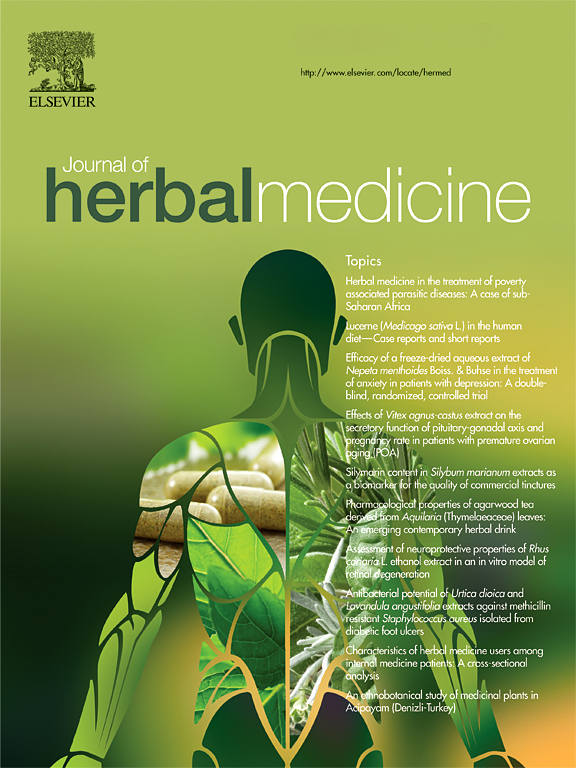Comparative Effect of N-Acetylcysteine and Thyme Syrup on Arterial Blood Gases in Intubated ICU Patients: A Randomized Clinical Trial
IF 1.9
4区 医学
Q2 INTEGRATIVE & COMPLEMENTARY MEDICINE
引用次数: 0
Abstract
Introduction
Tracheal intubation often causes mucus buildup, affecting arterial blood gas levels. N-acetylcysteine (NAC) is used to clear secretions. Also, thyme can alleviate respiratory symptoms. This study compares the effects of NAC and thyme extract on ABG levels in intubated intensive care unit (ICU) patients.
Methods
This randomized, double-blind clinical trial compared the effectiveness of herbal thyme syrup and intravenous NAC in 70 intubated patients in ICU. Participants were randomly assigned to receive either thyme syrup (2 g orally, twice daily for 5 days) or intravenous NAC. Both groups received standard airway secretion clearance techniques. Primary outcomes included ABG parameters (O₂, pH, HCO₃⁻, CO₂) and pulmonary secretion volume, recorded daily for 5 days. Statistical analysis was performed using SPSS v.22 with P < 0.05 considered significant.
Results
A total of 70 ICU patients were enrolled, with 35 patients in each treatment group. The Thyme group showed significantly higher oxygen levels (P < 0.001) and improved pH (P = 0.005) compared to the NAC group, while CO₂ levels were significantly lower in the Thyme group (P = 0.001). No significant differences were observed between the groups in terms of bicarbonate levels (P = 0.110). Exudate clearance did not show significant improvement in either group (P = 0.995). Baseline characteristics were balanced between the two groups, with no significant differences in age, gender, or smoking status.
Conclusions
Thyme concentrate may improve oxygenation, reduce CO2, and balance acid-base levels in ICU patients.
n -乙酰半胱氨酸与百里香糖浆对ICU插管患者动脉血气影响的随机临床试验
气管插管常引起粘液积聚,影响动脉血气水平。n -乙酰半胱氨酸(NAC)用于清除分泌物。此外,百里香还能缓解呼吸道症状。本研究比较了NAC和百里香提取物对插管重症监护病房(ICU)患者ABG水平的影响。方法本随机双盲临床试验比较中药百里香糖浆与静脉注射NAC对70例ICU插管患者的疗效。参与者被随机分配接受百里香糖浆(2 g口服,每天两次,连续5天)或静脉注射NAC。两组均采用标准气道分泌物清除技术。主要结果包括ABG参数(O₂,pH, HCO₃,CO₂)和肺分泌量,每天记录5天。采用SPSS v.22进行统计学分析,P值 <; 0.05为显著性。结果共纳入ICU患者70例,每个治疗组35例。与NAC组相比,百里香组显着提高了氧气水平(P <; 0.001),改善了pH值(P = 0.005),而CO₂水平在百里香组显着降低(P = 0.001)。两组间碳酸氢盐含量无显著差异(P = 0.110)。两组患者的渗出液清除率均无明显改善(P = 0.995)。基线特征在两组之间是平衡的,在年龄、性别或吸烟状况上没有显著差异。结论百里香浓缩液具有改善ICU患者氧合、降低CO2、平衡酸碱水平的作用。
本文章由计算机程序翻译,如有差异,请以英文原文为准。
求助全文
约1分钟内获得全文
求助全文
来源期刊

Journal of Herbal Medicine
INTEGRATIVE & COMPLEMENTARY MEDICINE-
CiteScore
3.90
自引率
0.00%
发文量
94
期刊介绍:
The Journal of Herbal Medicine, the official journal of the National Institute of Medical Herbalists, is a peer reviewed journal which aims to serve its readers as an authoritative resource on the profession and practice of herbal medicine. The content areas of the journal reflect the interests of Medical Herbalists and other health professionals interested in the clinical and professional application of botanical medicines. The objective is to strengthen the research and educational base of herbal medicine with research papers in the form of case studies, original research articles and reviews, monographs, clinical trials and relevant in vitro studies. It also publishes policy statements, opinion pieces, book reviews, conference proceedings and profession related information such as pharmacovigilance reports providing an information source for not only the Herbal Practitioner but any Health professional with an interest in phytotherapy.
 求助内容:
求助内容: 应助结果提醒方式:
应助结果提醒方式:


